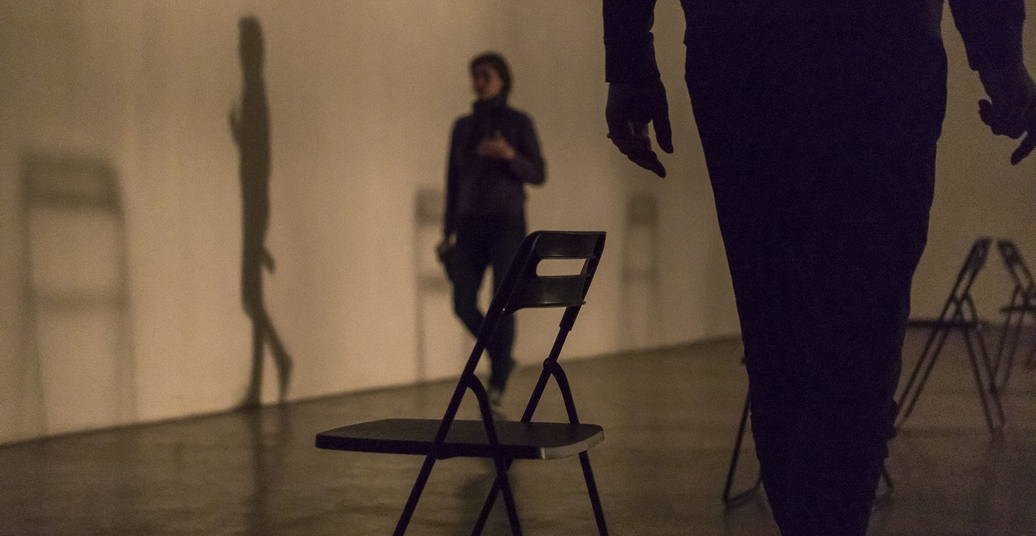“Blind Date”, premiere Friday 1 November in the framework of OPEN SPACES at Tanzfabrik, is collectively authored and performed by Ayşe Orhon, Christina Ciupke, Clément Layes, Igor Dobriči, Jasna L. Vinovrški, and Litó Walkey.
There are six, very different, empty chairs on the stage, one of which is so beautifully made, I fall in love with it. They are arranged in a straight line, spreading across the breadth of the wide and spacious room, directly facing us, the audience. We don’t get chairs of our own, however. Instead we are given thin, black cushions in two rows on platforms. The lights fade.
I’ve already read the programme, and I know that these six performers had 25 one-to-one encounters with each other over a few months, and that the performance we’re about to watch has been “woven from the fragile substance of all those improbable encounters.” I’m intrigued by the process of creation behind the work, which seems to be built on intimacy and chance, and I’m curious to see how the group translates their private encounters towards a public. Much later I discover that each performance is different: the group role a die to decide which person’s story they will tell that evening.
The performers enter in darkness, slightly visible from a soft light coming in from the windows behind us. Each of them has those nifty little microphones floating almost invisibly beside their mouths. One by one they start to speak, sometimes alone and sometimes together, until the voices slowly find their rhythm and fill the darkened room. The composition is winding and quite beautiful, made up of words and phrases, all in English, of varying poetic content. On this particular night, we hear of a small blue book, the Moon, a landscape, a castle, trees, water, curators, and DJs. Certain words are picked up by the performers and repeated, repeated, stretched out, and adjusted – and then put down. An almost-story is introduced, pronouns shifting and rippling, before it evaporates. The ambling soundscape follows a particular rhythm; it’s musical yet conversational and almost feels like a sound you would find in a forest. The figures to whom these voices belong are moving calmly about the space. Their bodies have a kind of ‘soft presence’ in the room, taking a secondary role to their collective, lyrical, voice-song, which is painting a series of images that seem to follow the patchy logic of dreams. I can’t always tell who is saying what, and for a long time I enjoy this flow of language in the dimly lit space.
I consider the title – “Blind Date” – and my mind begins to wander: darkness, encounters, going on dates, meeting someone new, magic, the mundane, feeling uncomfortable. And I am uncomfortable! We all are. There is nothing to lean our backs against on these platforms, so we shift constantly in the darkness that holds within a calm and beautiful, but borderline monotonous, aural landscape. Someone next to me sighs and whispers to their friend: “Still 25 minutes to go!” I’m surprised. I’ve usually found Berlin audiences to be tolerant and respectful of very demanding theatre. But I don’t blame them: I’ve been moving all evening between the chin-in-elbows-on-knees position and the straight-yoga-back position, desirous of, and almost taunted by, the beautiful chairs in front of me.
A moment comes where the voices lift into a climax; a cacophony of words as the performers repeat together, “Make a point!”. I half-expect this self-referential moment to trigger a change in the lighting or the movement, but it doesn’t. I realise things are going to continue, largely unchanged, and this realisation makes my anticipation for something else fall away. In its place, I start to notice something beautiful occurring on the wall behind the performers. The light from the window, which I thought was fixed, starts creeping across the wall. Patterns reminiscent of rain appear out of nowhere. The effect is mesmerising and almost imperceptible. Is this, I wonder, the thing I’ve been waiting for? If so, it’s surprisingly satisfying and incredibly subtle.
After a few moments, however, my body reminds me once more that it is still seeking some kind of relief from the unfriendly seating situation. I realise this is more of a listening piece than a watching piece, and my back is basically tired and sore, which makes listening hard. Another audience member gives in and moves to the floor in order to lean their back against the platform. I immediately do the same. In the rush of relief that follows, I am re-energised and find myself able once more to admire the collective skill behind creating and sustaining this blanket of poetic sound. I drift contentedly along the dark river of looping words until the performance ends.
Although the work evokes a dreamy quality of memory and magic, I can’t help but feel that the performers have not fully considered their audience. How differently this work might have been received if the audience had chairs with backs, or could lie down and recline, or even walk about in the space and fully enter their memory of meeting. Perhaps they wanted us to shift and squirm, but a body that is relaxed and comfortable is certainly more willing to follow the unravelling song of an intimate encounter.




